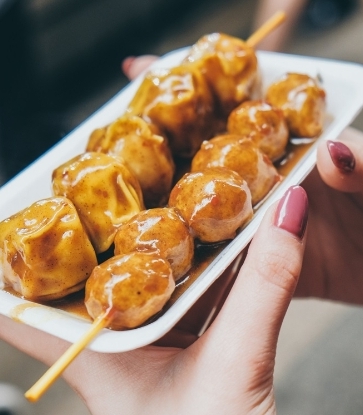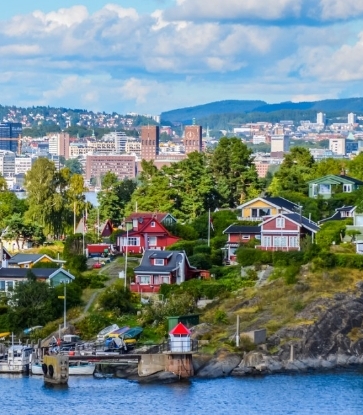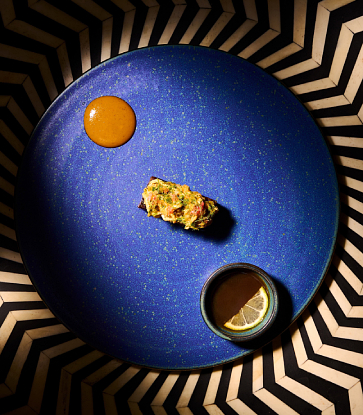Climate change is one of the greatest challenges everyone must face. Each of us can help fight the crisis. Leading chefs and restauranteurs are playing their parts in this sustainability journey via their cooking and operations. Chefs and owners featured in MICHELIN Guide Thailand – from traditional French establishments, and hyper-local Northeastern joints, to Thai fine-dining and street food restaurants – are sharing tips on what you can do.
Let’s all become a green hero.

Chef Amerigo Tito Sesti, Head Chef
J'AIME by Jean Michel Lorain, Bangkok (One MICHELIN Star, MICHELIN Guide Thailand 2023)
Since 2022, J’AIME by Jean Michel Lorain has been researching how to revolutionise its culinary operations. In addition to the ever-present quality and elegance, this fine-dining establishment wants to be more eco-friendly, reducing carbon footprints from their operations.
“We are a French restaurant that favours tradition. But that doesn’t mean we don’t take part in the fight against climate change. To help reduce carbon emissions, we lower the percentage of imported ingredients. They’re below 2% and will lower even more in the coming months. ‘We want our operations to be ethical while promoting Thailand’s unique characteristics. So, we are creating new menus that retain the tastes and origins. We understand this could affect our popularity, but it’s the only way forward. The change is very challenging. We stop including beef. We replace a lot of ingredients with local ones such as Thai organic flour, sugar, oil, and vegetables as well as dairy products like milk, butter, and cheese. Herbs, nuts, and protein sources are replaced as well. But we get to talk to and support local farmers while reducing waste’.
“We hold weekly meetings on sustainability management. They touch on services, menu creation, and sustainable practices. We now reduce organic waste by 74% Going forward, we hope to create a positive impact and awareness for friends, families, and customers.’
Chef’s sustainability tips: reduce the use of meat-based stock. Focus more on vegetable stock. Make the most of all parts such as peels, dried pieces, and scraps. Plan your cooking to minimise waste. For example, only make meat-based sauce when you can cook the whole animal. How each part is being prepared? How will you manage the scraps to minimise organic waste?

Peeranat Choodoung, Owner and Director of Baan Somtum Group Co., Ltd
Baan Somtum (Sathon), Bangkok (Bib Gourmand, MICHELIN Guide Thailand 2023)
Who says street food can’t save the world? Baan Somtum (Sathon) proves that everyone, big or small, can contribute to environmental sustainability. They just want to do it. And becoming green is a win-win strategy.
“Previously, it was challenging to operate sustainably. It meant steep costs. But, today, everyone can easily contribute to the environment. There are manufacturers as well as products and services with eco-friendly dimensions. Baan Somtum now takes sustainability into account when we manage costs. We try to make the most out of everything. Start from energy management. We switched to energy-saving bulbs and devices. Our air-conditioners are cleaned before summer to prevent it from overloading. This helps save electricity and bills.
“We also plan our ingredient management to minimise waste. For example, if the produce we receive is subpar or beyond their “golden period”, we can use them to make meals for ourselves. For packaging, we choose materials that will deliver an improved customer experience. They are compostable or recyclable. This is a win-win strategy. We save money and the world. Customers get a better experience”.
Owner’s sustainability tips: We want everyone, both individuals and restaurants, to become green. Start by thinking about what we can do to benefit everyone. Write down the ingredients you use daily and weekly, and see how much you have left. Then, create a forecast for the next weeks and months. Which holidays are coming up? How many customers are expected to come? This will help manage ingredients in your shops or houses by reducing food waste. Tracking your electricity bills to see your usage pattern is another way to become green.

Chef Paisarn Cheewinsiriwat, Chef-Owner
Kaen, Khon Kaen (Recommended restaurant, MICHELIN Guide Thailand 2023)
Kaen sets itself apart as a hyper-local Northeastern restaurant. Local ingredients here help support local farmers and showcase Isan wisdom at the same time. Kaen’s sustainability policy covers the entire supply chain – from upstream to downstream.
“Our upstream process prioritises ingredients from Khon Kaen before expanding to other Northeastern provinces. Most of our ingredients are local. We want the neighbourhoods to grow with us. There are other benefits of choosing local produce. Its quality is good. It’s fresher. It helps with ecological balance and reduces carbon emissions. The perception of fine food has changed. Previously, we needed to use imported goods. Lobster needed to be from Canada, and caviar from Iran. Now, people look for local cuisine because they reflect values and identities. This is the modern luxury and our upstream process.
“Midstream is nose-to-tail cooking. For galangal, its stem is used for Miang, a wrapped appetizer. We cook the rhizome in Tom Kha (Coconut soup). Fish is wrapped with the leaves before grilling. We don’t discard imperfect ingredients, or ‘ugly food’, but prepare them in different ways, provided that their tastes and textures are of the required quality. Take tomatoes for example. The perfect ones can be served fresh. Those with some aesthetic imperfections become a sauce. Another important midstream process is “people”. Kaen provides training so its personnel are better aware of this concept. Ingredients should be used wholly. Reuse everything that we can.
“For downstream, Kaen sorts recyclables and sends them to organisations that handle them. Organic waste becomes fertilizer for the small herb garden next to our restaurant. These are our green policies.”
Chef’s sustainability tips: Explore your local or green markets instead of supermarkets. When the community thrives, the entire economy flourishes. Minimize food waste. Your body is the best composter. Be creative and turn leftovers into new menus. For example, if you don’t finish your Nam Prik Kapi (Chili Shrimp Paste Dip), it can become an ingredient for Khao Pad Long Rua (Spicy Shrimp Paste Fried Rice) or Gaeng Run Juan (Beef Curry with Chili Shrimp Paste Dip). A small portion of leftovers can become Gaeng Ho (Northern Mixed Curry). Vegetable scraps in your fridge can be turned into Jab Chai (Vegetable Stew) or Tom Proe (Northeastern Bamboo Shoot and Herbal Soup). Rice-washed water can be used for preserving vegetables.

Hans Christensen, Owner
The House by Ginger and Ginger Farm Kitchen, Chiang Mai (Bib Gourmand, MICHELIN Guide Thailand 2023)
The complete cycle of sustainable production and consumption can be achieved. Hans Christensen has proven this with both of his farm-to-table restaurants – The House by Ginger and Ginger Farm Kitchen (Bib Gourmand, MICHELIN Guide Thailand 2023).
“We clearly communicate and ensure our people follow green practices. Food waste from the kitchens becomes fertilizer for our Chaing Mai farm. We also built a central kitchen next to the farm so we can prepare some food that can be cumbersome to do in the kitchen. This way, we have good control over ingredients. Today, climate change is the biggest threat. As a restaurant, we need to operate responsibly and contribute to the fight. Small places can also help. Sorting your waste and sourcing local ingredients can immediately make an impact.
“Our focus when developing menus is to create as little waste as possible. We try to use as many local and seasonal ingredients as possible. Our sauces, dips, and salsa are made in-house. We just started a fermentation programme to reduce food waste even further. Earlier this year, we joined forces with plant-based experts to develop plant-based menus we’re launching later this year. There’s a plan to increase crop diversity on our farm. We also work with local farmers on chemical-free produce, which will help us avoid long-distance food transport. Local products are also prioritised if they meet our qualities. They don’t need to be exactly the same as we have in Chiang Mai.
“Lastly, I believe it’s about educating ourselves. We work closely with government agencies. Send our personnel to training. We invited agricultural experts and food scientists to help us better achieve our goals. We know we can do more.”
Chef’s sustainability tips: Do not buy more than you can eat. Buy locally instead of imported goods to help reduce carbon emissions. Remember that organic produce may not look appealing, but it’s safer and usually tastier. Don’t be shy to ask for a doggie bag. And try composting.”
“Don’t forget to use these amazing tips to help save our world. When you’re travelling, dining, or shopping, support green enterprises. Sustainable tourism is one path to making this world a better place.”
For updates on travel destinations, contact TAT Call Center 1672, or Facebook TAT Contact Center.
Illustration images: © Kaen, J'AIME by Jean Michel Lorain, Baan Somtum, The House by Ginger























